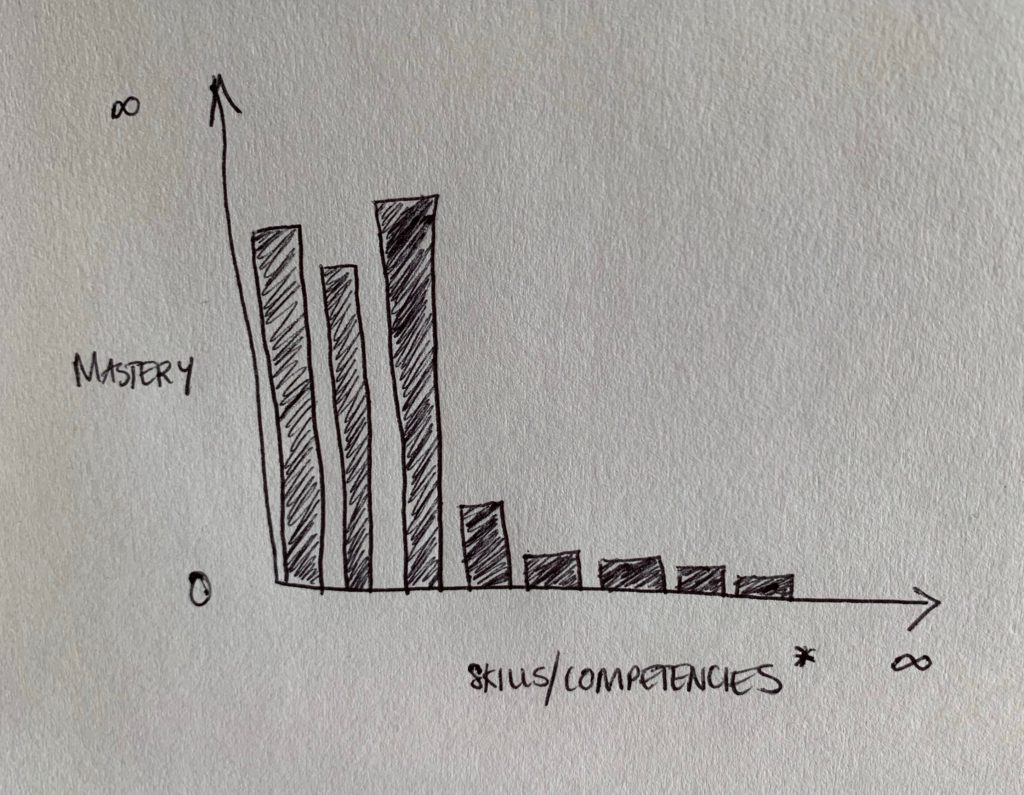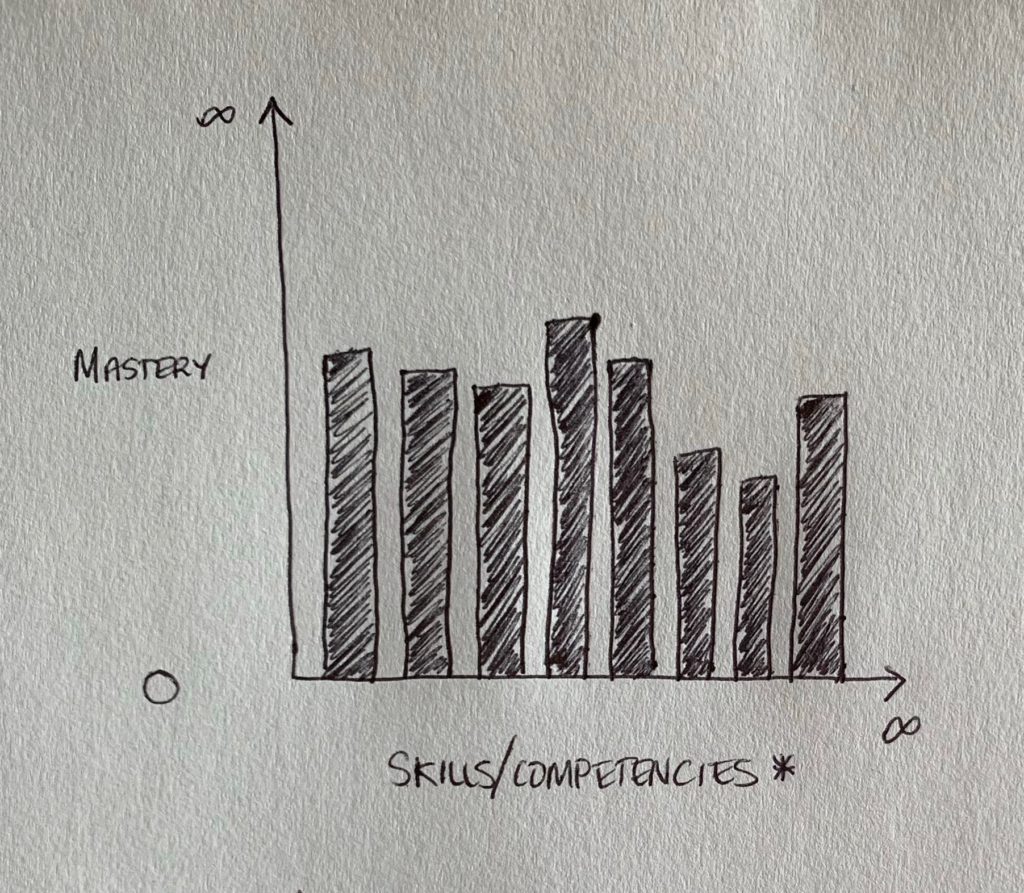If we built teams and companies with people from diverse educational backgrounds, from the Humanities to the Sciences, we could solve the toughest problems we face as a society, such as climate change and gender equity. But before we can tackle these challenges, we, as a society need to change the way we value and support non-technical competencies. We need to view all educational disciplines as having equal value. We need to view soft skills as having equal value to hard skills, in other words soft skills would just be skills, as Esther Perel said during her SXSW 2019 keynote talk. We need to see the combination of diverse skills and academic backgrounds as more powerful than the current model for building products and experiences. It’s time that we usher in new rules for assembling teams, products, and companies. Doing so would not only change the products and companies we build but also the global society we live in.
The Problem: What We Value
Let’s take a look at one of the most predominant software companies of recent time, Facebook. Judging by the company’s recent ethical scandals ranging from data privacy (or lack thereof) to rampant unchecked fake news, which permitted foreign governments to influence American elections, it’s clear that Mark Zuckerberg valued software engineering and profits over customer’s lives. Zuckerberg valued people’s data because he and his company could profit from it. A recent Medium article by Douglas Rushkoff explores what would’ve happened if Mark Zuckerberg had stayed in school. Rushkoff argues that “by forgoing a college education, Zuckerberg may have denied himself – and the world – the benefit of some historical, cultural, economic, and political context for his work. And we are all now paying the price for his impatience.” By not finishing college, Zuckerberg demonstrated that he valued his abilities in math, science, and engineering, and those who shared similar technical mindsets over studies in the humanities.
The truth is that Zuckerberg isn’t the only one who feels this way. Our society has fostered an unhealthy imbalance. The evidence for this comes in the form of higher wages for highly technical positions as compared to less technical, liberal arts type positions. Because we have devalued the humanities or anything not STEM, we have also decreased the supply of academically diverse and socially dynamic citizens. But, why do we value math, engineering, and science as superior skills? What happened to valuing all the skills that are important to developing as humans and ultimately creating our collective society? Is there a way to embrace multidisciplinary backgrounds and competencies? The answer is yes. And, it turns out to be one of the requirements for humans living in the 21st century and beyond.
The Solution: New Value Rules, New Teams
In his book, Robot-Proof: Higher Education in the Age of Artificial Intelligence, Joseph E. Aoun, makes a compelling argument for the new and required “literacies” for us to thrive as humans: data literacy, technological literacy, and human literacy. Becoming at least proficient in each of these literacies is absolutely essential for us. Advancements in artificial intelligence, nanotechnology, internet of things, and the inevitable convergence of technologies, new and old, as discussed by Kevin Kelly in What Technology Wants, further support Aoun’s case for humans to diversify their knowledge base. I’ve realized as an engineer, I too, need more diverse skills and have worked to improve my human literacy by taking on more leadership roles, reading a broad range of texts, and writing about the intersection of entrepreneurship and diversity. I recognize being only technically minded doesn’t serve me or our society. It’s time for us to see that technical and non-technical competencies are important for building the experiences and products that make up our world. It’s time for us to let go of valuing only certain core competencies, especially when building teams and companies.
Thinking through the concept a bit more, I modified a couple sketches originally created by Matt Sparks to describe where society is currently and where we need to go. The first sketch shows what society typically values today, someone who is highly technical for example but without many other core literacies or competencies. The second sketch shows what society will need to value, someone with math, engineering, entrepreneurial, and humanities competencies. As society embraces the second sketch, single-disciplinary individuals will no longer be relevant.


What society needs to value…
* Skills/competencies include: science, math, english, philosophy, art, etc. They also include Joseph E. Aoun’s three literacies: data literacy, technological literacy, and human literacy.
Valuing multidisciplinary competencies will allow us to build multidisciplinary teams, companies, and societies. We may also discover a positive effect of valuing more than math and engineering capabilities: conscious creation of diverse and inclusive teams. Building multidisciplinary teams allows us to identify issues like bias, data privacy, and other ethical dilemmas during the product ideation phase and address them prior to hastily releasing a product with negative after effects for the people who interact with it. These seemingly opposing and differing educational disciplines also incorporate human-centric features into every facet of product design, something that most companies today forget to include. People with broader competencies have been exposed to a greater collection of ideas, interactions, and experiences. More diverse and inclusive teams bring often overlooked perspectives to brainstorming and design sessions and identify potentially new and truly innovative solutions. The products and experiences diverse and inclusive teams build look much different from those of homogenous and tech-centric teams.
After assembling a team with multidisciplinary backgrounds, start building small projects. Why start small? Because small projects allow you to test, make necessary changes, and iterate rapidly. Starting small also means that any mistakes are less likely to have a major negative effect on society. Iterations and improved product drafts can happen more rapidly as the team improves the product’s value. During the testing and experimentation phase, you can check how your team interface is working. A team interface is the sharing of ideas and product feedback between team members. It considers items such as: how well team members communicate with each other; valuing team members equally; and best practices for converting innovative ideas into equally transformational and useful products or experiences. Team interface is used to generate new and innovative ideas for products and improve upon existing products. As we create a streamlined team interface, we can begin developing products that solve larger problems. Experience by experience and product by product, we will then begin to see our positive contributions in the world, and watch as they eventually reach a global scale.
A Gesamtkunstwerk Future
Once we have multidisciplinary teams with seamless team interfaces and communications, we can embrace our individual differences in the products and experiences we create. Multidisciplinary teams create more diverse experiences and products instead of building yet another software plug-in or tool that supports only more software or productivity tools. Multidisciplinary teams are the key to tackling the challenging global problems that may not have been considered before. Multidisciplinary teams are the key to producing today’s Gesamtkunstwerk, or total work of art, a term coined by Richard Wagner in 1849. Gesamtkunstwerk stems from the concept of bringing a variety of people together from varying backgrounds – writers, actors, singers, costume designers, prop creators, musicians, and composers – to create some of the greatest operatic works we still know and love today. By building multidisciplinary teams today, we can create new works of art and begin addressing our most pressing problems we face as humanity. This new approach to team formation will allow us to be artists instead of vandals as Austin Kleon writes in his latest book, Keep Going. The Silicon Valley culture of moving fast and breaking things doesn’t add value or connect humanity.
The decision to build teams of multidisciplinary thinkers, artists, and problem-solvers is a simple one but not an easy one to execute. However, this Gesamtkunstwerk approach will give us the tools to help us design a more human centered society. Because, as it turns out, we will need more than software engineers to solve the monumental challenges of today and tomorrow. This shift in beliefs and team structure becomes increasingly important as we begin to build the mirrorworld, or the merged world of digital and physical spaces, as described by Kevin Kelly. Once we more fully embrace multidisciplinary teams, we will begin the journey towards advancing humankind. We will begin creating a world where all people matter, a world where we solve our toughest problems together.